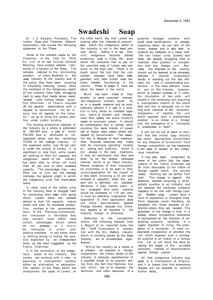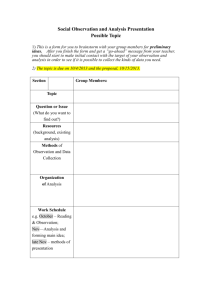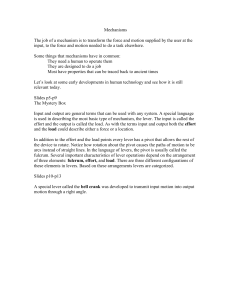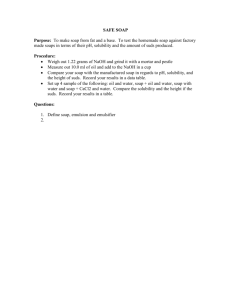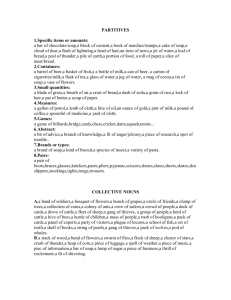Swadeshi Soap — Lever Bros' Reply
advertisement
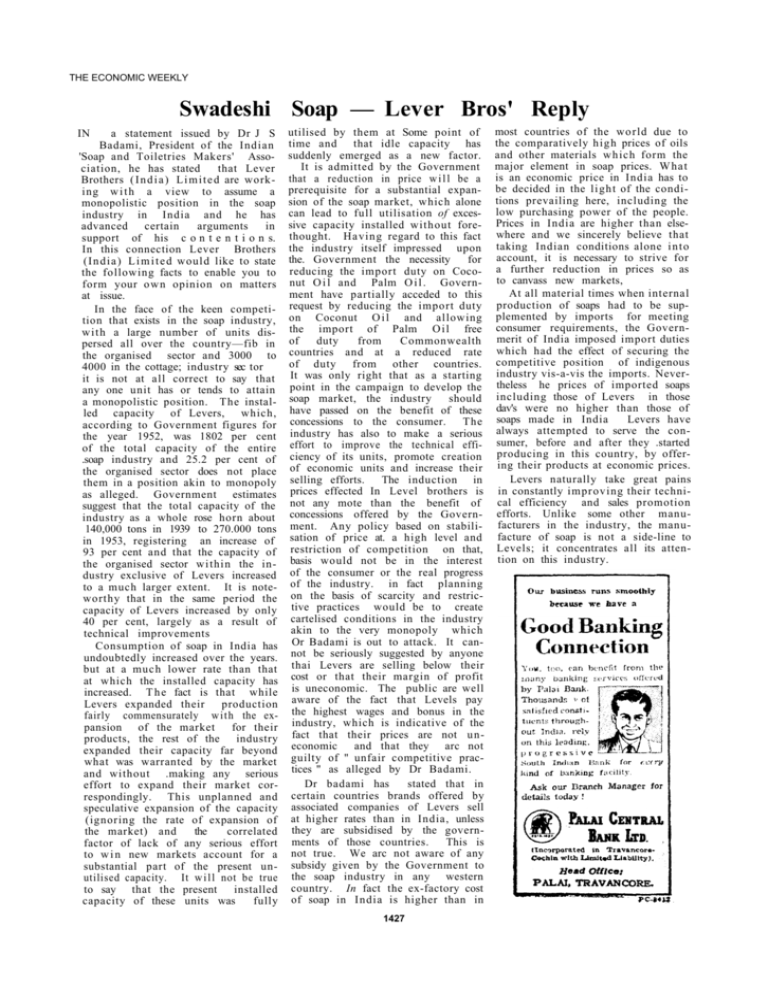
THE ECONOMIC WEEKLY Swadeshi Soap — Lever Bros' Reply IN a statement issued by Dr J S Badami, President of the Indian 'Soap and Toiletries Makers' Association, he has stated that Lever Brothers ( I n d i a ) L i m i t e d are working w i t h a view to assume a monopolistic position in the soap industry in India and he has advanced certain arguments in support of his c o n t e n t i o n s. In this connection Lever Brothers ( I n d i a ) L i m i t e d would like to state the following facts to enable you to form your own opinion on matters at issue. In the face of the keen competition that exists in the soap industry, w i t h a large number of units dispersed all over the country—fib in the organised sector and 3000 to 4000 in the cottage; industry sec tor it is not at all correct to say that any one unit has or tends to attain a monopolistic position. The installed capacity of Levers, which, according to Government figures for the year 1952, was 1802 per cent of the total capacity of the entire .soap industry and 25.2 per cent of the organised sector does not place them in a position akin to monopoly as alleged. Government estimates suggest that the total capacity of the industry as a whole rose horn about 140,000 tons in 1939 to 270.000 tons in 1953, registering an increase of 93 per cent and that the capacity of the organised sector within the industry exclusive of Levers increased to a much larger extent. It is noteworthy that in the same period the capacity of Levers increased by only 40 per cent, largely as a result of technical improvements Consumption of soap in India has undoubtedly increased over the years. but at a much lower rate than that at which the installed capacity has increased. T h e fact is that while Levers expanded their production fairly commensurately with the expansion of the market for their products, the rest of the industry expanded their capacity far beyond what was warranted by the market and without .making any serious effort to expand their market correspondingly. This unplanned and speculative expansion of the capacity (ignoring the rate of expansion of the market) and the correlated factor of lack of any serious effort to w i n new markets account for a substantial part of the present unutilised capacity. It w i l l not be true to say that the present installed capacity of these units was fully utilised by them at Some point of time and that idle capacity has suddenly emerged as a new factor. It is admitted by the Government that a reduction in price w i l l be a prerequisite for a substantial expansion of the soap market, which alone can lead to full utilisation of excessive capacity installed without forethought. Having regard to this fact the industry itself impressed upon the. Government the necessity for reducing the import duty on Coconut O i l and Palm O i l . Government have partially acceded to this request by reducing the import duty on Coconut O i l and allowing the import of Palm O i l free of duty from Commonwealth countries and at a reduced rate of duty from other countries. It was only right that as a starting point in the campaign to develop the soap market, the industry should have passed on the benefit of these concessions to the consumer. The industry has also to make a serious effort to improve the technical efficiency of its units, promote creation of economic units and increase their selling efforts. The induction in prices effected In Level brothers is not any mote than the benefit of concessions offered by the Government. Any policy based on stabilisation of price at. a high level and restriction of competition on that, basis would not be in the interest of the consumer or the real progress of the industry. in fact planning on the basis of scarcity and restrictive practices would be to create cartelised conditions in the industry akin to the very monopoly which Or Badami is out to attack. It cannot be seriously suggested by anyone thai Levers are selling below their cost or that their margin of profit is uneconomic. The public are well aware of the fact that Levels pay the highest wages and bonus in the industry, which is indicative of the fact that their prices are not uneconomic and that they arc not guilty of " unfair competitive practices " as alleged by Dr Badami. Dr badami has stated that in certain countries brands offered by associated companies of Levers sell at higher rates than in India, unless they are subsidised by the governments of those countries. This is not true. We arc not aware of any subsidy given by the Government to the soap industry in any western country. In fact the ex-factory cost of soap in India is higher than in 1427 most countries of the world due to the comparatively high prices of oils and other materials which form the major element in soap prices. What is an economic price in India has to be decided in the light of the conditions prevailing here, including the low purchasing power of the people. Prices in India are higher than elsewhere and we sincerely believe that taking Indian conditions alone into account, it is necessary to strive for a further reduction in prices so as to canvass new markets, At all material times when internal production of soaps had to be supplemented by imports for meeting consumer requirements, the Governmerit of India imposed import duties which had the effect of securing the competitive position of indigenous industry vis-a-vis the imports. Nevertheless he prices of imported soaps including those of Levers in those dav's were no higher than those of soaps made in India Levers have always attempted to serve the consumer, before and after they .started producing in this country, by offering their products at economic prices. Levers naturally take great pains in constantly improving their technical efficiency and sales promotion efforts. Unlike some other manufacturers in the industry, the manufacture of soap is not a side-line to Levels; it concentrates all its attention on this industry.
